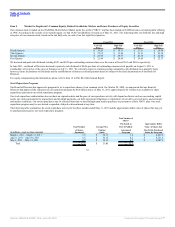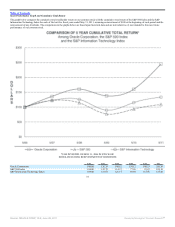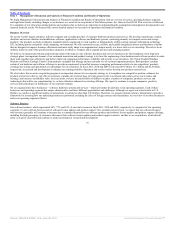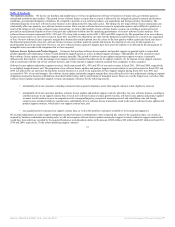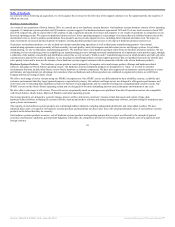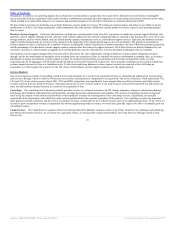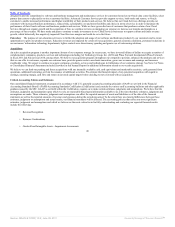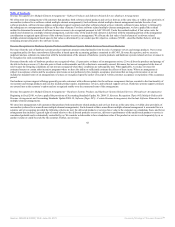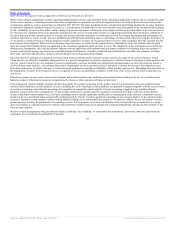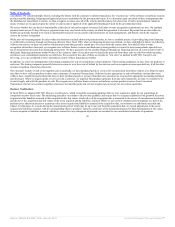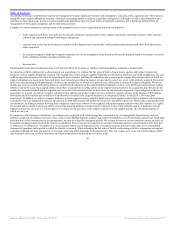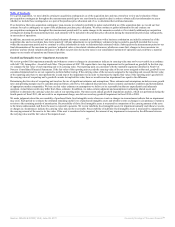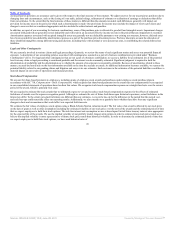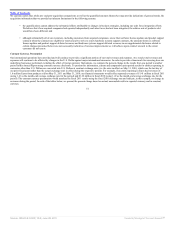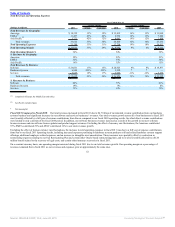Oracle 2010 Annual Report Download - page 46
Download and view the complete annual report
Please find page 46 of the 2010 Oracle annual report below. You can navigate through the pages in the report by either clicking on the pages listed below, or by using the keyword search tool below to find specific information within the annual report.
Table of Contents
Revenue Recognition for Multiple-Element Arrangements—Software Products and Software Related Services (Software Arrangements)
We often enter into arrangements with customers that purchase both software related products and services from us at the same time, or within close proximity of
one another (referred to as software related multiple-element arrangements). Such software related multiple-element arrangements include the sale of our
software products, software license updates and product support contracts and other software related services whereby software license delivery is followed by
the subsequent or contemporaneous delivery of the other elements. For those software related multiple-element arrangements, we have applied the residual
method to determine the amount of software license revenues to be recognized pursuant to ASC 985-605. Under the residual method, if fair value exists for
undelivered elements in a multiple-element arrangement, such fair value of the undelivered elements is deferred with the remaining portion of the arrangement
consideration recognized upon delivery of the software license or services arrangement. We allocate the fair value of each element of a software related
multiple-element arrangement based upon its fair value as determined by our vendor specific objective evidence (VSOE—described further below), with any
remaining amount allocated to the software license.
Revenue Recognition for Hardware Systems Products and Hardware Systems Related Services (Nonsoftware Elements)
Revenues from the sale of hardware systems products represent amounts earned primarily from the sale of computer servers and storage products. Our revenue
recognition policy for these nonsoftware deliverables is based upon the accounting guidance contained in ASC 605, Revenue Recognition, and we exercise
judgment and use estimates in connection with the determination of the amount of hardware systems products and hardware systems related services revenues to
be recognized in each accounting period.
Revenues from the sales of hardware products are recognized when: (1) persuasive evidence of an arrangement exists; (2) we deliver the products and passage of
the title to the buyer occurs; (3) the sale price is fixed or determinable; and (4) collection is reasonably assured. Revenues that are not recognized at the time of
sale because the foregoing conditions are not met are recognized when those conditions are subsequently met. When applicable, we reduce revenues for
estimated returns or certain other incentive programs where we have the ability to sufficiently estimate the effects of these items. Where an arrangement is
subject to acceptance criteria and the acceptance provisions are not perfunctory (for example, acceptance provisions that are long-term in nature or are not
included as standard terms of an arrangement), revenues are recognized upon the earlier of receipt of written customer acceptance or expiration of the acceptance
period.
Our hardware systems support offerings generally provide customers with software updates for the software components that are essential to the functionality of
our systems and storage products and can also include product repairs, maintenance services, and technical support services. Hardware systems support contracts
are entered into at the customer’s option and are recognized ratably over the contractual term of the arrangements.
Revenue Recognition for Multiple-Element Arrangements—Hardware Systems Products and Hardware Systems Related Services (Nonsoftware Arrangements)
Beginning in fiscal 2010, we have applied the provisions of Accounting Standards Update No. 2009-13, Revenue Recognition (Topic 605) Multiple-Deliverable
Revenue Arrangements and Accounting Standards Update 2009-14, Software (Topic 985)—Certain Revenue Arrangements that Include Software Elements to our
multiple-element arrangements.
We enter into arrangements with customers that purchase both nonsoftware related products and services from us at the same time, or within close proximity of
one another (referred to as nonsoftware multiple-element arrangements). Each element within a nonsoftware multiple-element arrangement is accounted for as a
separate unit of accounting provided the following criteria are met: the delivered products or services have value to the customer on a standalone basis; and for an
arrangement that includes a general right of return relative to the delivered products or services, delivery or performance of the undelivered product or service is
considered probable and is substantially controlled by us. We consider a deliverable to have standalone value if the product or service is sold separately by us or
another vendor or could be resold by the customer. Further, our revenue
42
Source: ORACLE CORP, 10-K, June 28, 2011 Powered by Morningstar® Document Research℠



